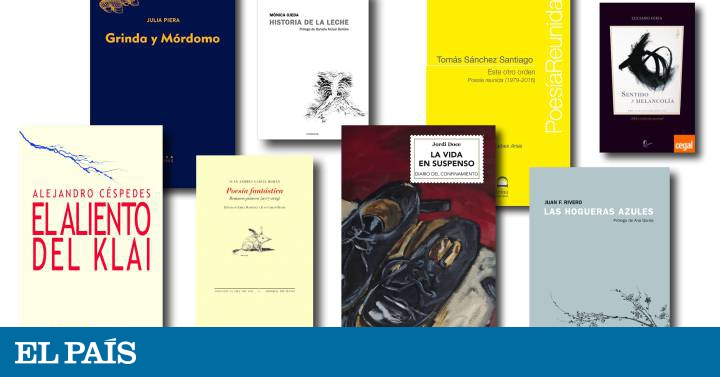In this atypical
rentrée
, with cabin syndrome and no book fair, one takes to thinking about Adorno's famous statement and wondering if it still makes sense to write (about) poetry in times of coronavirus.
The answer is that the muses cannot be confined by neighborhoods or discriminated by lyrical genre.
However, if the pandemic has only changed the wallpaper of the poets, who now recite their sweet regret via
streaming
, the same cannot be said of the news tables, where the
precovid
hits
that kicked off at the start of the de-escalation are mixed with the postponed pitches and the urgency of award season.
Thus, we propose to re-fish some titles that were swept away by the black tide of the virus and to bring out others that exhibit the glittering brilliance of the new.
Hopefully this fall will only last as long as winter takes.
And may winter catch us confessed and with the curve in free fall.
Of poetry gathered
One of the best pandemic diaries that I have had the opportunity to read ―with permission from
La vida en suspenso
(Fórcola, 2020), by Jordi Doce― is the one that Tomás Sánchez Santiago has been publishing in installments on the blog
Los cuadernos pálidos
, hosted in the digital magazine
El Cuaderno
.
To Tomás Sánchez Santiago we owe the appearance of
This Other Order.
Poetry reunited (1979-2016)
(Dilema, 2019), in which the Zamorano author records a trajectory that begins with
Amenaza en la fiesta
and ends provisionally with
Loss of there
.
Between one and the other we find the transcendent evocation of
En familia
(1994), which shows that what is closest can also be sublimated, or the disjointed verbal investigation of
El que disort
(2006).
With a rough texture and an uneasy look, this writing attests to a transitory and persistent world, like the buzzing "of the October flies / rotting the quinces, turning them blue / of a desperate resin."
If Sánchez Santiago enjoys the clandestine prestige of the secret poets, the work of Luciano Feria had barely appeared in limited editions and not always easily accessible.
For this reason, the publication of
Sentido y melancolía
(RIL, 2020), which collects his three collections of poems published between 1989 and 2004, is more about discovery than consecration.
In fact, it is enough to immerse yourself in the verses of Feria to admire the construction of a symbolic universe of precise geometry, halfway between the ritual fire of vision and a mythological birth that refers to the memory of the origins and the weather of the collective history: "Life was sowing definitive words / like a poem."
Bonfires lit
Apart from her commitment to narrative, Candaya has been and is a poetry publisher.
To the collection dedicated to verse are now added two books of disparate style, but of notable interest:
Las bongueras azul
, by Juan F. Rivero, and
Historia de la leche
, by Mónica Ojeda.
The first engages in an active dialogue with certain forms of Japanese poetry (specifically, tanka and haiku) to offer a set of seasonal etchings where the quintessential representation of the landscape, contemplative plasticity and a proverbial wisdom distilled in the Eastern tradition converge. .
However, the mastery of Asian compositional molds does not reduce the merits of its author to those of the diligent scribe, but rather there is a “seed of truth” that is projected onto the humble and immediate, as Ana Gorría warns in the prologue.
For example, a button: “I close the laptop.
/ Has not yet reached / to the threshold.
/ He comes at a tired step.
/ The ladder warns me ”.
Rivero's elocutive serenity is transformed into an expressive tsunami in
Historia de la leche
, where the Ecuadorian Mónica Ojeda integrates the narrative achievements of
Nefando
(2016) and
Mandíbula
(2018) in a poetic language of Old Testament resonances and expressionist iconography.
At the same time as the rewriting of Genesis, a parable about cainism and classical tragedy in miniature,
Historia de la leche
subordinates its slight narrative connection to a gloomy aesthetic that not only speaks of a ceremonial and atavistic cruelty, but of a daily violence that penetrates even the bones: "You will carry the skull of poetry on the twisted spine of your mind."
Here and there
Like any neighbor's son, the poet remembers when traveling was not an experiment, but an experience.
With
Grinda and Mórdomo
(Abada, 2020), Julia Piera completes the trilogy undertaken with
Puerto Rico digital
and
B from Boston
.
Between a small island in Stockholm (Grinda) and a town on the Galician Costa da Morte (Mórdomo), the author reconstructs a vital itinerary that is, above all, a path of initiation.
Far from the tourist
clues and the
picturesque gaze,
Grinda y Mórdomo
stands as an oracular prediction, an encrypted hieroglyph or an illuminating trance that laments the ecological plunder and dreams of a sustainable habitat, synthesis of “living nature” and “local micronarratives ”.
The physical journey becomes a mental journey in
El aliento del klai
(Huerga y Fierro, 2020), by Alejandro Céspedes.
Written between 2002 and 2005 and inspired by a documentary about orphaned children in ancient Eastern Europe, the author raises an elegy that shuns the cliché forms of
pornomery
and anticipates the deautomatization strategies rehearsed from
a blank page topology
(2012) and
Voice-overs
(2016).
The pertinent rescue of this book, hitherto unpublished, confirms the uniqueness of a technique that oscillates between verses chant and the informative density of prose, that appropriates testimonial speeches and conversational grafts and that expands beyond the page written, through web links and QR codes.
Of poetry as a 'sampler'
Under the title of
Fantastic Poetry.
First summary (2007-2019)
(Pre-Texts, 2020), this anthology by Juan Andrés García Román records one of the most personal journeys of recent Spanish poetry.
Rearrangement of previous materials - from
Chipped phosphorus
(2008) to
Fruit for the superstition bird
(2017) -, recovery of truncated projects and advancement of unpublished, the volume reflects the growth of an organic production that fuses an imagination of a neo-romantic stamp and a tone of grotesque farce.
Beyond the various findings of his published books, this selection is interested in the series that opens it ("Poeziyas") and the series that closes it ("Time Machine").
In both, the folkloric immersion in the Andalusian tradition (with the inlay of original and apocryphal jarchas) coexists with an oral sampling that refers to the transposition that Rodrigo Cuevas has carried out on the basis of Asturian popular music in
Manual de cortejo
.
Of inexhaustible verbal inventiveness and powerful metaphorical pull ("The purple has come out / off the white like a monk"), this
Summary first more than
fulfills its mission and leaves us wanting more.
Readings
Life on hold
.
Jordi Doce.
Fórcola, 2020. 160 pages.
15.50 euros.
Meaning and melancholy
.
Tomás Sánchez Santiago.
RIL, 2020. 268 pages.
18 euros.
The blue bonfires
.
Juan F. Rivero.
Candaya, 2020. 112 pages.
12 euros.
History of milk
.
Monica Ojeda.
Candaya, 2020. 128 pages.
13 euros.
Grinda and Mórdomo
.
Julia Piera.
Abada, 2020. 96 pages.
13 euros.
The breath of the klai
.
Alejandro Céspedes.
Huerga y Fierro, 2020. 102 pages.
13 euros.
Fantastic poetry
.
Summary first (2007-2019)
.
Juan Andrés García Román.
Pre-Texts, 2020. 172 pages.
22 euros.








